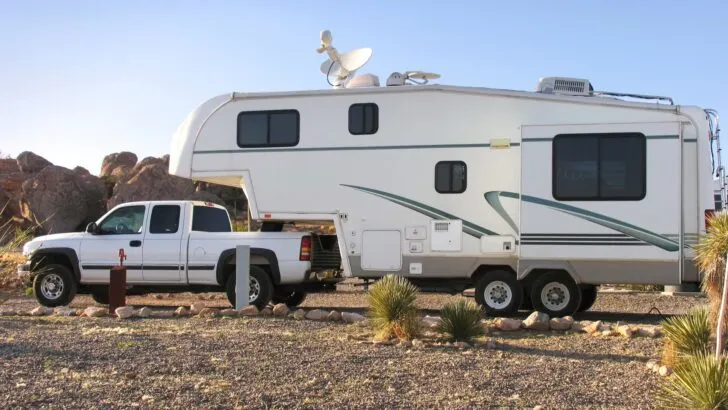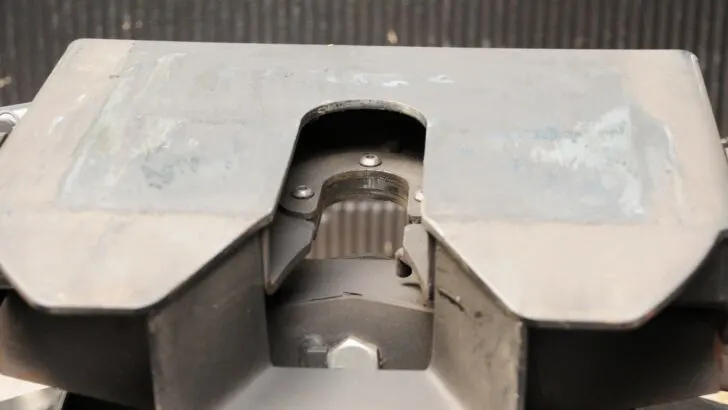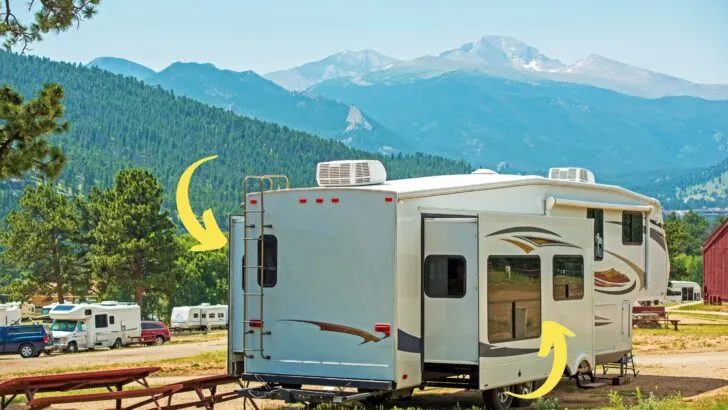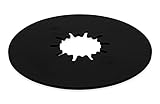What is a fifth wheel? They’re just travel trailers, right? Well, not so fast.
While a 5th wheel camper is a towable RV, it’s different from standard travel trailers. In fact, a towable RV that’s called a fifth wheel (or 5th wheel) is distinguished from other travel trailers in a variety of ways.
Not only are they different in terms of exterior design and interior layout, but towing one is different from hauling other campers.
In today’s post, we hope to clear up the confusion by answering the question “What is a fifth wheel camper?” with some important details and distinctions that make them unique.
What Is a Fifth Wheel Trailer?
A 5th wheel RV, is a towable rig with a large cap at the front. This is one of the main features that distinguish a fifth wheel from any other type of travel trailer. The cap sits over the bed of the truck that serves as the towing vehicle.

Fifth wheels aren’t all one size. Some are extremely large with multiple slide-outs, and some are a bit smaller, like the one shown here.
Under the cap, most have a steel pin box with mounting holes on one end. This is where a steel shaft called a kingpin connects to the front of the fifth wheel.
Pickup trucks that tow 5ths are equipped with a heavy-duty hitch installed into the bed of the truck. That wheel hitch clamps around the fifth wheel’s kingpin, locking the trailer and the hitch together.

Here you see a close-up view of the locking jaws of a fifth wheel hitch in the bed of a pickup truck.
So, the manner of towing is one significant distinction of a 5th wheel camper.
Another noteworthy difference between common travel trailers and a fifth wheel type of RV has to do with the living space inside.
5th wheel floor plans allow for multiple levels and slide-outs. The large living area afforded by the space they offer is possibly the biggest reason why these rigs are so popular with full-time RVers.
What Are the Pros and Cons of a Fifth Wheel Camper?
As with any RV setup, there are pros and cons here.
The trick, as always, is to identify the setup that works best for your family and your style of travel.
Let’s take a look at the pros and cons of 5th wheel travel trailers.
Pros
We’ll start by taking a look at the advantages, which can be considerable.
Space
Fifth wheels offer a LOT of room for the size of the rig, some up to as much as 500 sq. ft. That’s larger than some tiny houses and city apartments!
Some 5ths are extremely luxurious, and many have enough space to offer most of the amenities of a sticks & bricks house.
They not only offer a sizable living area but lots of storage space as well.
This is one of the reasons why 5th wheels are popular among both full-timers and families.
Better Towing Experience
Fifth-wheel hitch/towing provides better handling and control than with a bumper-pull/travel trailer.
Placing the weight of the trailer directly over the truck’s axle helps significantly with balance and sway prevention, making it a better towing experience overall.
Home-Like Interiors
The floorplans of fifth wheel campers are often more home-like than other RVs. A variety of layouts are made possible by the step-up area (into the cap), and often include multiple RV slide-outs.

Most fifth wheels have slide-outs (some have several), that serve to increase the interior living space of the rigs substantially. We’ve seen floorplans with as many as FIVE slideouts!
Some have island or peninsula kitchens with residential-size appliances. Some even have actual bathtubs!
Value
Fifth wheel owners get a lot of bang for their buck.
Despite the fact that they’re some of the most spacious rigs on the road, they’re nowhere near as expensive to buy as large Class A RVs and other big rigs are. (Of course, lacking a drivetrain, 5ths have a built-in price advantage here.)
With a fifth wheel, you get a lot of living and storage space for your money.
Cons
Like anything else, there are some downsides. Let’s take a look at the disadvantages of owning and traveling in a fifth wheel camper.
Big and Heavy
5th wheels tend to be larger and heavier than other travel trailers, so they require a bigger truck to tow.
Loss of Truck Bed Space
Because the fifth-wheel hitch is located in the bed of the truck, you lose the use of much of the truck bed when you’re towing the camper. And many hitch designs remain in the way even when not towing.
Need to Properly Balance the Camper and Truck
Balancing the size of the truck and trailer is important when you’re towing a 5th wheel.
You have to ensure that the fifth wheel overhang isn’t too long, or the bed of the truck too short. Otherwise, you could hit the back of the truck with the fifth wheel when maneuvering. Breaking the rear window on the truck is an awful self-inflicted wound.
Fifth Wheel Hitches Require Maintenance
In addition to maintaining the camper and the truck, the hitch itself requires maintenance.
They have multiple moving parts, including the king pin locking assembly. There are several parts at work here, and they need to be lubricated regularly.
Some 5th wheel owners use a plastic “hitch disc” or “lube plate” similar to this one to help protect against friction:
- Helps protect your 5th wheel trailer against friction and wear
- Cushions vibrations
This helps with the lubrication of the skid plate, but other hitch parts still require regular lubrication.
White lithium grease is often recommended for the purpose of lubricating all of the moving parts.
- 2 Pack Value - Includes 2 Tubes - Meets NLGI-2 performance
- Long lasting
Is a Fifth Wheel Worth It?
Absolutely! They’re incredibly popular for a reason. Depending on your travel & living style, a 5th wheel may be well worth having.
But as with all RVs, the best rig is the one that suits your needs best.
If you live and travel full-time in an RV, travel with family, or if you spend considerable time living in your rig in one place, a fifth wheel could be just the perfect rig for you.
Other travelers may look at our summary of answers to the question “What is a fifth wheel?” and immediately recognize that it’s not the right RV for them.
In the end, if you have a good understanding of what owning a fifth wheel entails, we’re sure you’ll be able to assess whether or not it’s the best home-on-wheels for you.
Free RVing Tips, Tricks, Reviews, Giveaways & More
Subscribe to our daily newsletter! We’ve been full-time RVers for 20 years (!) and share everything we’ve learned about RVing in our daily blog posts. Join our online community to receive a wealth of great RVing knowledge delivered right to your inbox.
Whether this is your first time on the road or you’re a seasoned full-timer, you’ll love the wide range of RVing topics we cover. Don’t miss a single article or any of our famous RV gear Giveaways — Subscribe today!




Erik Basilier
Friday 29th of March 2024
When comparing a 5W to a TT, there are some nuances that I haven't seen any blogger cover: differences in parking space requirements. I park my TT in my limited-length driveway, which is perpendicular to a narrow street. The truck will be at an angle to the trailer when hooking up and unhooking. Recently I backed in and the truck ended up at about 50 degrees which is a little more than normal. It turned out to be impossible to unhook. The ball just didn't want to come out. I ended up having to dismount the hitch from the truck receiver. Apparently with my setup, I need to stay at 45 degrees or less for normal unhooking. If I were to upgrade to a 5W, what angles would be acceptable for hooking/unhooking? How is that limit dependent on choice of hitch, such as going with the Anderson vs a standard 5W hitch? Also, is the length of the 5W always measured from the pin to the extreme rear? Bottom line: Given my limited space, will I be able to get more trailer internal length with the 5W, while still being able to hook up and unhook at an angle that doesn't cause problems?
Gay Tacoma (Washington) Travel Enthusiast (Jason)
Friday 29th of March 2024
I know what a 5th wheeler is. My grandparents had one when I was a boy back in the 80s. Instead of attaching the hitch to the rear bumper, it would extend over the bed of a pickup truck, in their case it was a 1976-77 Ford F350 pickup truck. The trailer looked larger than the truck itself. I guess when you're 10 yrs old, most anything looks looks huge! I remember laughing and asking "How the hell are they able to move this beast?!" (laughs)
What I've never understood was why it's called a "5th wheeler". Except for the usual wheels on each side of the trailer, I've never seen an extra "5th wheel".
Gay Tacoma (Washington) Travel Enthusiast (Jason)
Friday 5th of April 2024
@Dan Guyor, It's possible. I've never seen the hitching mechanism used to hitch the trailer to the bed.
Dan Guyor
Friday 29th of March 2024
Jason, The way it was explained to me years ago is that the fifth wheel isn't on the trailer, it's in the truck. The slide plate looks like most of a wheel lying in the bed of the truck, therefore it's the fifth wheel on the truck. The trailer took the name because it's the fifth wheel that's used to pull it. - Dan